Thessaloniki was the city that hosted this year’s "SE Europe Energy Dialogue (SEEED)”, IENE’s long established event focusing on the regional energy agenda, which took place on June 26-27, 2018. "Energy Market Transition and Energy Security in SE Europe” was the special theme for this year’s SEEED, signifying the state of flux that characterises SE European energy markets today and the emergence of energy security as a topic of prime importance for energy policy. The conclusions and recommendations that were drawn, a summary of which follows, are now available at the special microsite of the event and have also been posted on this site under the Reports Section.
11th SEEED Conclusions and Recommendations Announced
Thessaloniki was the city that hosted this year’s "SE Europe Energy Dialogue (SEEED)”, IENE’s long established event focusing on the regional energy agenda, which took place on June 26-27, 2018. "Energy Market Transition and Energy Security in SE Europe” was the special theme for this year’s SEEED, signifying the state of flux that characterises SE European energy markets today and the emergence of energy security as a topic of prime importance for energy policy. The conclusions and recommendations that were drawn, a summary of which follows, are now available at the special microsite of the event and have also been posted on this site under the Reports Section.
As far as conclusions are concerned a major finding is that SE Europe, in contrast to the rest of Europe, remains committed to continuing coal use. Hence, the road towards decarbonization and the transition to a "greener” future in SE Europe, with higher use of natural gas and renewables, appears difficult, if not uncertain, in comparison with the rest of Europe. At the 11th SEEED, the key role that the European Union is playing in energy developments in SE Europe, through the intervention of the European Commission, was amply demonstrated.
The importance of regional energy cooperation was stressed further during this conference as a key building block for the Energy Union since close cooperation between major actors can advance EU energy policy objectives, help integrate energy markets and increase security of supply. Central and SE Europe Energy Connectivity (CESEC) is such one initiative which has helped bring together EU Member States and Energy Community Contracting Parties. Furthermore, the challenges and difficulties now faced by the European electricity industry, as European market integration becomes a reality, were highlighted in several presentations. One of the most important challenges is the further optimisation of the use of existing interconnectors.
Alsoenergy poverty emerged during the conference as one of the main challenges now faced by SEE countries. Most conference delegates agreed that a common approach should be implemented regarding the definition of energy poverty by the EU Member States, which would beneficial as it would allow the effective coordination of policy interventions in order to protect vulnerable consumers. Emphasis was also placed on the high correlation between the percentage of the population that lies on the poverty line, and the percentage of the population, now facing increased debts in their electricity bills. More specifically, more than 30% of the total population of three Balkan countries (i.e. Greece, Serbia and Bulgaria) faces problems with the payment of bills.
A number of recommendations were formulated by the conference organizing committee after reviewing in detail the conference proceedings and the various presentations and interventions by Energy Dialogue participants. These are summarized as follows:
(1) There is a need for convergence of the national laws of SEE countries with the European acquis in relation to the energy consumers’ rights and protection in electricity and gas sectors, with special focus on enhancing energy efficiency.
(2) Each SEE country should strive to implement its part in the development of joint infrastructure projects in order to enhance energy interconnectivity (mainly gas and electricity), market operation and security of energy supply with benefits for the consumers.
(3) There is a need to develop organized power exchanges in Montenegro, Albania, FYROM and Bosnia and Herzegovina and promote day-ahead market coupling in Western Balkans through the WB6 Memorandum of Understanding on regional electricity market development.
(4) As some countries in the SE European region are using nuclear energy for power generation (Bulgaria, Romania, Croatia, Slovenia, Turkey) and are either expanding them in building new ones, the nuclear option for power generation in the broader region should be seriously considered especially since it bodes well with decarbonization policies.
(5) There is a need to develop environmental friendly schemes and more detailed country strategies in order to attract private investment in SEE’s renewable energy and energy efficiency sectors versus carbonization attempts.
(6) There is a need to introduce digitalization technologies in the transmission and distribution grids and smart metering to improve the operation and management of the system, as well the reliability and the resilience, offering better services to the consumers and high RES penetration as well.
(7) The energy poverty issue should be properly assessed and included as an important parameter in energy efficiency programmes in SE Europe. National programmes to address energy poverty should offer implementation mechanisms specifically designed to improve energy efficiency for vulnerable consumers and ensure access to these programmes to low-income households. Apart from implementing low-cost energy efficiency measures to tackle energy poverty, these should also encompass: replacement of household appliances, replacement of inefficient heating system (with the use of renewables, where possible), different levels of retrofitting the building envelope, total renovation of the buildings, subsidies, which are suitable and useful for energy-poor households (e.g. in the case of high interest rates), interest free loans should be introduced, and all state-owned or council housing should be renovated to improve the housing conditions.
(8) A yearly review of the energy agenda of the SEE region should be undertaken in order to meet new challenges - where energy security once again is emerging as key priority - by policy setting organisations, such as the EC and the OECD/IEA, which could be backed by specialised organisations with good knowledge of the region, such as the Energy Community, CESEC, the Energy Charter, the Banks (e.g. EBRD, EIB and Black Sea Trade and Development Bank) and IENE.




